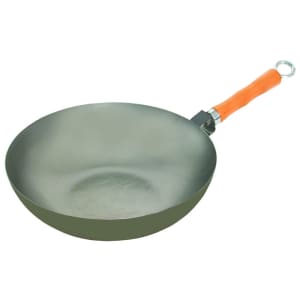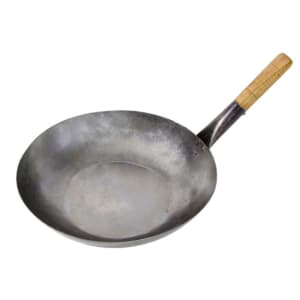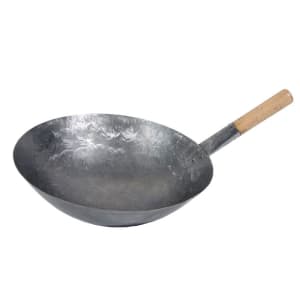Wok & Stir Fry Pans
Restaurant wok pans concentrate high heat at the bottom of the pan, creating quick, delicious stir frys with contrasting textures and brilliant colors. We carry various commercial wok pan styles and materials so every operator can find one that fits their needs. More
Commercial Woks: What You Need to Know
Restaurant woks are designed for intense, high-heat cooking. Their steep sides help concentrate heat near the bottom of the pan for quick stir frying. Most are made from either cast iron or carbon steel – two materials that reach high temperatures quickly. Their deep interiors make them well-suited for stovetop deep frying, as well. Stir fry pans work with any flat range, while Chinese woks work best with specifically designed wok ranges.
Whichever style of stir fry pan or commercial wok you choose, the pan material plays a big part in how happy you'll be with the purchase. Steel, aluminum, and iron – all in different forms – are the primary materials used in making these pans, and each has its own benefits and drawbacks.
Common Questions About Restaurant Woks
Are stir fry pans and Chinese woks the same thing?
While the terms are often used interchangeably, stir fry pans and Chinese woks aren't the same. Restaurant woks typically have a rounded bottom rather than the flat bottom of stir fry pans. Not all woks are completely rounded, though; many have a few inches of flat space on the bottom, although it's less than you would find on a commercial stir fry pan. There is overlap, as well, so consult the product specifications page before purchase to determine if the pan you're considering is exactly what you want.
What material should I choose?
Restaurant wok pans come in four main metals.
- Aluminum: The least expensive and lightest of the options. Aluminum resists corrosion and heats up quickly, but it doesn't maintain heat as well as the others. It's also the least durable.
- Cast iron: The heaviest and most traditional option. Cast iron takes a while to heat up but maintains its heat well. This is a favorite of many chefs.
- Stainless steel: Resists corrosion and is highly durable. Stainless steel is the go-to metal for most foodservice applications, but it is more expensive than some of the others.
- Carbon steel: A lightweight, durable, and attractive option. Carbon steel can be more expensive than stainless, but it transfers heat well and is resistant to corrosion and other damage, such as dents and scratches.



